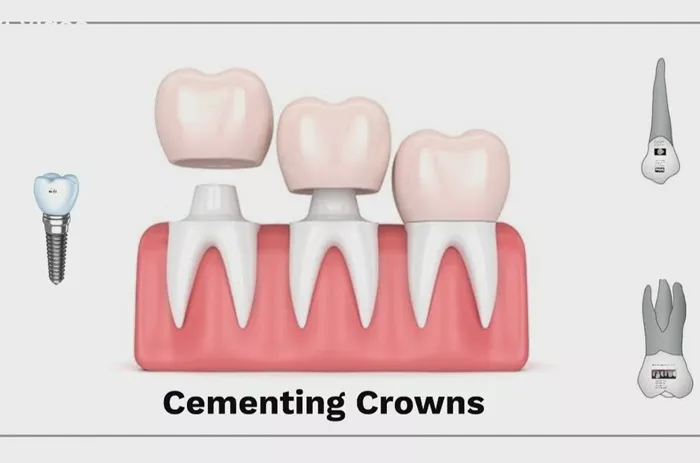Dental crowns are common restorative treatments used to protect damaged teeth or improve aesthetics. After a crown is cemented, it is essential to follow specific care instructions to ensure its longevity and avoid complications. One common question patients ask is: how long after a crown is cemented can I drink coffee?
This article will provide detailed guidance on this topic. It also covers related dental care concepts such as gum inflammation and gum disease, which can affect the health of the tooth and surrounding tissues after crown placement.
What Happens When a Crown Is Cemented?
The Cementation Process
When a dental crown is ready, the dentist uses a dental cement to permanently bond the crown to the prepared tooth. This cement forms a strong seal that keeps the crown in place and protects the underlying tooth from bacteria and decay.
Initial Setting and Hardening Time
Dental cements vary in their setting time, but most modern cements set within a few minutes to hours. Despite this, the cement continues to harden and strengthen for up to 24-48 hours after placement. During this time, the bond between the crown and tooth becomes more stable.
Why Is Waiting Important Before Drinking Coffee?
Effect of Hot Beverages on Cement
Hot beverages like coffee can temporarily soften or weaken some dental cements if consumed too soon after cementation. This can compromise the seal, causing the crown to loosen or shift. It may also allow bacteria to enter, increasing the risk of gum inflammation or gum disease.
Impact on Gum Tissue
Immediately after crown placement, the surrounding gum tissue may be tender or slightly inflamed. Hot coffee can aggravate this inflammation, delay healing, and cause discomfort.
Recommended Waiting Time Before Drinking Coffee
Minimum Waiting Period
Dental professionals generally recommend waiting at least 24 hours after the crown is cemented before drinking coffee or other hot beverages. This allows the cement to fully set and the gums to start healing.
Why 24 Hours?
Most modern dental cements reach near-full strength within 24 hours. Drinking coffee before this time risks weakening the cement bond and exposing the tooth to bacteria. It also reduces the chance of disturbing the healing gum tissues.
Individual Variations
Some patients with sensitive gums or complicated dental work may need to wait longer, up to 48 hours, before consuming coffee. It is best to follow your dentist’s specific advice based on your case.
Tips for Caring for Your Crown After Cementation
Oral Hygiene
Maintain excellent oral hygiene to prevent plaque buildup that can lead to gum inflammation and gum disease. Brush gently around the crowned tooth and floss carefully to avoid disturbing the crown’s margins.
Avoid Staining Substances Initially
Besides coffee, avoid other staining agents such as tea, red wine, and tobacco for at least 24-48 hours. Newly cemented crowns can be more susceptible to discoloration before the cement fully hardens.
Be Careful with Temperature
Besides waiting before drinking hot coffee, avoid consuming extremely cold or very hot foods and drinks during the first day to reduce sensitivity and protect the gum tissue.
Monitor for Signs of Problems
If you notice pain, swelling, persistent gum inflammation, or the crown feels loose, contact your dentist promptly. These could be signs of cement failure or gum disease.
What If I Drink Coffee Too Soon?
Potential Consequences
Drinking coffee immediately after cementation can cause the crown to loosen or debond. This may require a dental visit to recement the crown. It can also increase the risk of bacterial infection, leading to gum inflammation or even gum disease around the affected tooth.
What to Do
If you have consumed coffee too early, avoid chewing on the crowned tooth, maintain good oral hygiene, and watch for symptoms like pain or swelling. Schedule a check-up with your dentist if you experience any issues.
The Role of Gum Health After Crown Placement
Importance of Healthy Gums
Healthy gums support the crown and protect the underlying tooth from infection. Gum inflammation after crown placement can cause discomfort and jeopardize the restoration’s success.
Preventing Gum Disease
Regular brushing, flossing, and dental cleanings help prevent gum disease. After crown cementation, it is especially important to keep the area clean to avoid plaque buildup along the gum line.
Signs of Gum Problems
Watch for redness, swelling, bleeding, or persistent discomfort around the crowned tooth. These may indicate gum inflammation or gum disease that requires professional care.
Additional Frequently Asked Questions
Can I Drink Cold Coffee or Iced Coffee Earlier?
Cold coffee is less likely to affect the cement setting than hot coffee. However, it is still best to wait at least 24 hours before consuming any coffee to protect the cement and gums.
What About Other Hot Drinks?
The same caution applies to tea, hot chocolate, and other hot beverages. Waiting 24 hours before consuming these drinks helps preserve the crown’s cement and gum health.
Can I Use Straws to Avoid Contact?
Using a straw may reduce direct contact with the crown and gums but does not eliminate risks. It’s better to wait the recommended period before drinking coffee.
Conclusion
Waiting at least 24 hours after a dental crown is cemented before drinking coffee is critical for the success and longevity of the restoration. This time allows the cement to fully set and the gums to begin healing, reducing risks of crown loosening and gum inflammation. Following your dentist’s instructions and maintaining good oral hygiene can prevent gum disease and keep your crown healthy for years to come.

